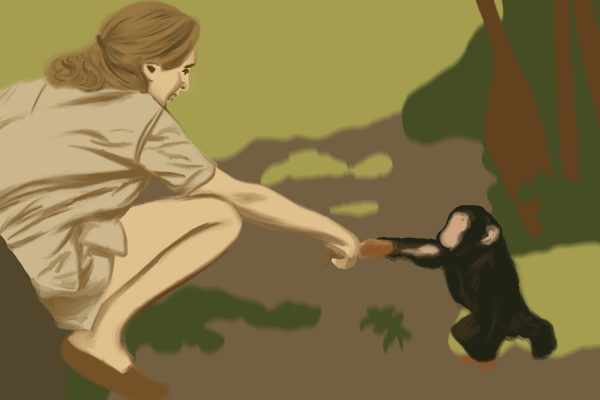One of the most important legacies a person can leave behind is one of change — of irreparably breaking glass ceilings, challenging the status quo and reimagining our perception of longheld beliefs.
Jane Goodall, in so many ways and across so many disciplines, had this phenomenal legacy.
Goodall died Oct. 1, and with her death comes an end of an incredible body of work that spans anthropology, primatology, ethics and sustainability.

Her career started unusually: She worked as a young waitress, with no prior experience in scientific research, before traveling to Kenya where she met Louis Leakey, a paleontologist who hired her as his secretary and allowed her to travel to Gombe to study chimpanzees.
But her non-scientific background, if anything, gave her a different perspective, and thus an advantage.
“At that time in the early 1960s, it was held at least by many scientists that only humans had minds,” she told the Wall Street Journal. “Only humans were capable of rational thought. Fortunately, I had not been to university, and I did not know these things. I felt very much as though I was learning about fellow beings capable of joy and sorrow, fear and jealousy.”
Goodall studied chimps more closely than anyone had before her, observing them for months and integrating herself into their lives to build trust. She made incredible observations that rocked the scientific community about chimpanzees’ personalities and use of tools — attributes that scientists previously understood only humans to possess.
She discovered even more human-like qualities among chimpanzees: a capacity for warfare, familial bonds and meat-eating. What many primatologists had accepted as fact suddenly came into question.
She undermined the criteria that scientists had used to distinguish humans from animals giving new meaning and scope to the human experience.
She continued to study and disseminate groundbreaking work on primatology for much of her life, and she became the main subject of many films and productions as well.
But her work expanded beyond science to activism. She started the Jane Goodall Institute in 1977 to promote chimpanzee conservation and sustainability. She also started the Roots and Shoots program in 1991, a youth-empowerment movement designed to affect community-level sustainable change.
Much of her later work focused on the importance of mitigating climate change, prioritizing conservation work and helping our planet’s biodiversity before it is too late.
“We have a window of time, but it’s not a very big window of time,” she said in an interview with the WSJ.
She represents a steady force of nature — someone who had a dream and a cause and dedicated their whole life to it, starting from the ground up as a waitress making tip money to get on a plane to Kenya.
As a person: groundbreaking. As a female scientist: even more so.
She emphasized the challenges of working as a woman in a male-dominated field in an 2018 essay for Time Magazine, writing, “When I was a little girl, I used to dream as a man, because I wanted to do things that women didn’t do back then such as traveling to Africa, living with wild animals and writing books.”
“I didn’t have any female explorers or scientists to look up to,” she continued, “but I was inspired by Dr. Dolittle, Tarzan and Mowgli in The Jungle Book — all male characters.”
She has become for so many people what she couldn’t find herself: a fearless, adventuring woman. Someone at the top of her field who pushed through challenges and became famous through her talent and persistence.
Now, little girls don’t have to look up to male figures, as Goodall once did, for their role models and inspiration.
Jane Goodall was someone who rewrote narratives left and right regarding science, gender roles and even the tenacity of the human spirit when given a cause.
The scientific community mourns the loss of an incredible changemaker.